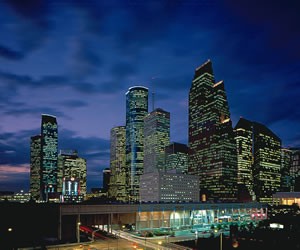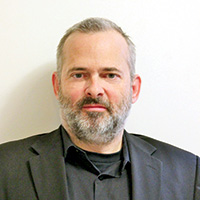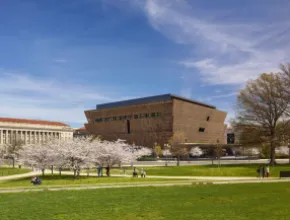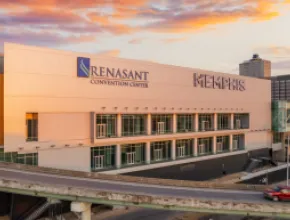Big, bold Texas can dish out superlatives without really trying—but when it saddles up and gets down to business, the results can be extraordinary. How else to explain the state’s certain economic stride coming out of the recession?
Among the bullish reviews in 2010, CNBC ranked Texas No. 1 for business in America, while Forbes proclaimed "Don’t Mess With Texas" because its big cities are "entering economic recovery mode well ahead of almost all the major centers along the East or West coasts."
Currently leading the Fortune 500 list with 57 headquarters (New York is second with 56), Texas is diversified across multiple sectors. According to Slate, other performance factors include its spirit of independence, its comparatively strong financial regulation and its embrace of globalization as the nation’s largest exporter.
"Texans have always had the ability to think big," wrote Slate in 2010. "Now that their state has become a player in the global economy, we can expect a new kind of swagger."
That confidence is certain to swell in February 2011, when Super Bowl XLV hits Cowboys Stadium in Arlington. Local anticipation is super-sized.
"This is an opportunity for the eyes of the world to focus on Arlington for the largest one-day event on the planet," says Jay Burress, president and CEO of the Arlington CVB. "Those eyes include planners and corporate executives deciding on future meeting and convention destinations—we want the Arlington area to be their top of mind choice for years to come."
Across key segments including convention centers and hotels, the Texas meetings and hospitality outlook is generally upbeat—but as Benchmark Hospitality International chairman and CEO Burt Cabanas notes, there is always room for improvement.
Having just celebrated 30 years in the conference market and with a Texas portfolio that includes the luxurious Hotel Contessa in San Antonio, Cabanas has an unrivaled vantage point on Lone Star meetings and hospitality. He shares the view that Texas has weathered the recession better than most.
"The oil and gas industry, our predominant producer, has for the most part been stable, and the AIG factor has not played as strong a role in meeting relocations or cancellations as it has played in Florida and Arizona," he says.
He believes that the state’s central location in the U.S., combined with great airline access and competitive rates, gives it "a front position for the meetings market, with 2011 improving on 2010 as 2010 improved on 2009." Dallas-Fort Worth, Houston, Austin and San Antonio will be the primary growth drivers going forward, especially where the state’s coastal and other secondary markets are concerned.
"Their return to higher group occupancy levels follows the cities," Cabanas says.
Brand integrity is one trend that Cabanas believes must be revisited to restart growth.
"Texas has a personality that America loves and competitors envy," he says. "Trying to play in the ‘sophistication game’ with ideas like valet parking only, jackets required and formal over friendly service will discolor the brand."
Overall, though, he sees Texas as the complete package.
"For the meetings market, Texas has it all—multiple destinations, convention and conference centers, exhibit halls, beach resorts, golf resorts and more, all covered by great people who give outstanding hometown service," he says.
Conventional Wisdoms
In South Texas, McAllen is its own commercial success story, recently recognized by CNN Money as one of the nation’s top midsize cities to launch a small business and highly ranked by Forbes and the Brookings Institute for post-recession employment recovery.
Another bellwether is McAllen’s convention business.
"We are closing in on a record number of annual bookings, and our hotel revenues and occupancy rates have been up for the past several quarters," says Nancy Millar, vice president and director of the McAllen CVB.
McAllen has weathered the downturn well, she says.
"Forbes ranked us in the top 10 cities for projected job growth over the next three years, and we are moving forward in developing infrastructure and planning for growth. Things are looking good in McAllen."
Similar optimism comes from Austin, where Mark Tester, director of the Austin Convention Center, reports that while relatively flat the last 12 months, bookings are accelerating for 2012 through 2014 and beyond.
"Tech sector events have been a plus," he says, crediting the "beyond expected" success of SXSW 2010 with helping lift hotel bookings and create the first hotel occupancy tax increase in over a year. Austin’s flavorsome reputation is also heightening interest from national groups, according to Tester.
"More evident every day is that nationals who may have never looked at us before now find that we fit their search for a uniquely compelling destination," he says.
"Flat" is also the word out of "Big D." Al Rojas, interim director of the Dallas Convention Center, says while the hospitality arena is showing signs of recovery, convention center growth remains level.
"The key to making 2010 a turnaround year will be attendance, which dropped, on average, 15 percent to 20 percent across all industries in 2009," Rojas says.
Continuing to focus on citywide trade shows, consumer shows and conventions, the DCC is working with the Dallas CVB to generate a market mix of events, such as more indoor sporting events. Additionally, Rojas says it will examine its current rent structure for each show to ensure that it is a good investment, while also realigning business contracts to ensure the client’s and the center’s needs are met.
Convention growth in Dallas may be horizontal for now, but the forecast is 23 stories of pure vertical—as Dallas finally gets its headquarters hotel.
Room Keys
Now taking definitive shape on the Dallas skyline, the Omni Dallas Hotel fulfills a quest of some 30 years.
"Dallas has so much to offer, but lacking a headquarters hotel, it has gone under-utilized as a convention destination," says Omni Hotels’ Ed Netzhammer, regional vice president, operations and general manager of the Omni Dallas Hotel. That is all set to change with the January 2012 opening of the striking new 1,001-room property, the brand’s largest in Texas and second largest overall.
Based in Irving, Texas, Omni Hotels is heavily concentrated in Texas.
"This is our home base," Netzhammer says. "We feel very invested in the project from a leadership standpoint."
Custom artwork and step-activated LED floor lights are among the new hotel’s distinct comforts—and if the dynamic performance of the 614-room headquarters hotel that Omni opened in Fort Worth in 2009 is any indicator, prospects for the Dallas property are healthy indeed.
"The Omni Fort Worth has double-digit RevPar growth this year," Netzhammer says. "It’s a great success story."
He adds that Omni’s Texas properties, which include San Antonio’s luxurious Omni La Mansion del Rio, have "fared better than average for upscale hotels."
And the brand is already guaranteed a Super Bowl win. The NFC champions will stay at the Omni Mandalay Hotel at Las Colinas in Irving, while the AFC champs will lodge at the Omni Fort Worth.
Another compelling RevPar story comes from the boutique market in Houston.
"Given the state of the economy, Houston is doing remarkably better than most cities," says Giorgio Borlenghi, owner of the upscale Hotel Granduca. "Performance-wise, we have the highest ADR and one of the highest RevPar in Houston, and are continuing to capture market share."
Attracting the global business elite, the 123-room Tuscan-inspired Granduca exemplifies how the upper-echelon corporate market in Texas has maintained altitude above the recession.
"Our goal is to continue building and growing that market share because the opportunity is there," Borlenghi says.
With 40 hotels and resorts in Texas, including the 1,003-room Grand Hyatt San Antonio, the 811-room Hyatt Regency DFW, the 1,120-room Hyatt Regency Dallas and the 342-room Hyatt Regency North Dallas, Hyatt Hotels & Resorts is also experiencing uplift.
"The second half of 2010 is shaping up nicely, with our Houston and Dallas feeder markets positively impacting in-the-year results with small to midsize meetings," says Irby Morvant Jr., Hyatt’s regional vice president of revenue, North America operations.
Other gains, according to Morvant, include a notable increase in corporate business segments such as high tech, medical and law, along with resurgent lead activity, site inspections and overall definite conversions from regional and national markets.
Big and Beaming
The Texas name alone is a siren call for travelers. According to Texas Tourism, 186 million domestic visitors journeyed to and within Texas in 2009, generating $51.8 billion in direct travel spending. International travelers are in the frame, too, accounting for approximately 10 percent of visitor spending, or about $4.9 billion. With the world’s biggest football game just ahead, the future continues to look bright.
"Regions hosting recent Super Bowls have frequently attracted double the number of visitors of their stadia seating capacity, with many fans coming for the experience," says Bill Lively, president and CEO of the North Texas Super Bowl XLV Host Committee. "With more than 100,000 fans expected in Cowboys Stadium, we anticipate the largest volume of visitors for a single event in North Texas history—and with many staying for four or more days, an unprecedented economic impact on the region’s hospitality industry."
Fort Worth is already kicking up its economic heels.
"In the first five months of 2010, our hotel demand was up 28 percent downtown and 8 percent citywide, which puts us above the national average in both hotel occupancy and demand," says David DuBois, president and CEO of the Fort Worth CVB.
As the AFC host city for the Super Bowl, the metrics are certain to go global. This is not the first Texas Super Bowl—Houston hosted the big game in 1974 and 2004—but it’s the first time for North Texas, and for "Cowboys and Culture" Fort Worth and its Metroplex neighbors, it’s an unprecedented moment to be discovered.
"This is our opportunity to introduce the meetings industry to an authentic destination unlike anywhere they have experienced in the past," says John Cychol, vice president of meeting sales for the Fort Worth CVB. "And from a future meetings and conventions perspective, we want this to be an experience that lasts."
The legacy is sure to be enduring.
"All of the energy that goes into producing the Super Bowl will show the major-event world that our city and region can host any size event and deliver it in a big way," says Arlington’s Burress. MT







